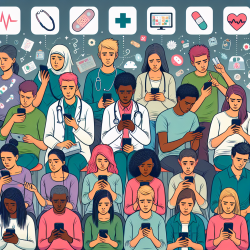Empowering Practitioners: Harnessing Blockchain for Secure and Private EHR Systems
In the digital age, the security and privacy of electronic health records (EHR) are paramount. The research article "Applications of blockchain in ensuring the security and privacy of electronic health record systems: A survey" offers insightful perspectives on utilizing blockchain technology to enhance EHR systems. For practitioners, especially those involved in online therapy services like TinyEYE, understanding and implementing these findings can significantly improve data security and patient trust.
Understanding Blockchain in Healthcare
Blockchain technology, known for its decentralized and immutable nature, offers a promising solution to the security challenges faced by traditional EHR systems. Unlike centralized models, blockchain provides a distributed ledger system where data is stored across multiple nodes, reducing the risk of data breaches and unauthorized access.
Key Benefits of Blockchain in EHR Systems
- Security and Privacy: Blockchain's cryptographic methods ensure that only authorized users can access sensitive health data, thus maintaining confidentiality and integrity.
- Decentralization: By eliminating the need for a central authority, blockchain reduces the risk of single-point failures and insider attacks.
- Auditability: Every transaction in a blockchain is recorded and immutable, providing a transparent audit trail that enhances accountability.
- Patient Empowerment: Blockchain allows patients to have control over their data, deciding who can access their health records and for what purpose.
Implementing Blockchain in Your Practice
For practitioners looking to integrate blockchain into their EHR systems, the following steps can be considered:
- Evaluate Current Systems: Assess your current EHR systems for potential vulnerabilities and areas where blockchain can enhance security.
- Choose the Right Blockchain Solution: Select a blockchain platform that aligns with your practice's needs, considering factors like scalability, security features, and interoperability.
- Train Your Team: Ensure that your team is well-versed in blockchain technology and its implications for data security and privacy.
- Engage Patients: Educate your patients about the benefits of blockchain in safeguarding their health information and how it empowers them with more control.
Encouraging Further Research
While blockchain offers numerous benefits, ongoing research is crucial to address emerging challenges and optimize its application in healthcare. Practitioners are encouraged to stay informed about the latest developments and contribute to research efforts that aim to refine blockchain technologies for better healthcare outcomes.
To read the original research paper, please follow this link: Applications of blockchain in ensuring the security and privacy of electronic health record systems: A survey.










